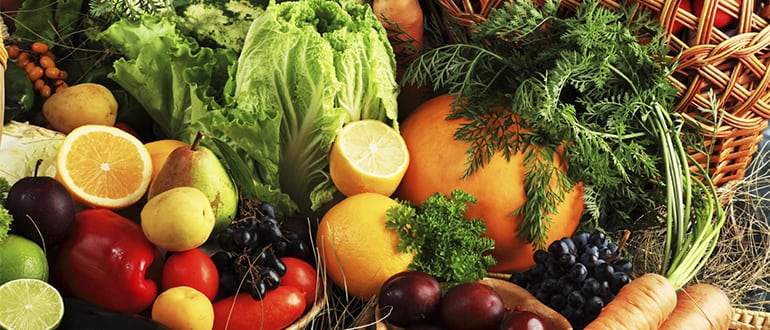Welcome to the our guide to food and diet! Whether you're a health-conscious individual or simply looking to improve your overall well-being, understanding the importance of what goes into your body is crucial. Food is not just fuel for our bodies; it has the power to nourish, heal, and energize us. In this comprehensive blog post, we will delve into the different types of food, explore the role of diet in our lives, uncover the benefits of a healthy eating plan, and reveal the best foods to include in your daily regimen.
Food is essential for our survival, along with water. It provides us with energy and nutrients required to live a healthy life.
Fruit and vegetables, meat, dairy products, whole grains and more are just some of the many types of foods available.
However, not all foods are good for us; whether it be due to allergies or high sugar content, we should give some foods a wide berth if possible. Check out the information below to find out what should and shouldn't be in your diet. So let's explore as we embark on this delicious journey together!
What is food?
What is food? It's a question that might seem simple, but the answer goes beyond just what we put on our plates. Food is not only a source of sustenance and nourishment for our bodies, but it also carries cultural significance and emotional connections.
Food can be defined as any substance that provides nutrients to an organism. It includes everything from fruits and vegetables to grains, meats, dairy products, and even beverages like water or juice. But food is more than just its physical composition; it encompasses flavors, textures, aromas, and the pleasure we derive from eating.
Food plays a vital role in our lives by providing energy for daily activities and supporting growth and development. It fuels our bodies so that we can function optimally both physically and mentally.
Additionally, food is deeply intertwined with social interactions and traditions. We gather around meals with family and friends to celebrate special occasions or simply enjoy each other's company. Different cultures have their own unique cuisines that reflect their history, geography, climate, and available resources.
Food is much more than mere sustenance; it nourishes us physically while bringing people together emotionally and culturally. Understanding the significance of food helps us appreciate its role in our lives beyond satisfying hunger pangs!
Best Selling Food Guides
Healthy Diets – BestSellers
What are the benefits of a healthy diet?
The benefits of a healthy diet are numerous and far-reaching. When we fuel our bodies with nutritious foods, we provide them with the essential nutrients they need to function properly. This can lead to increased energy levels, improved mental clarity, and better overall physical health.
One of the most noticeable benefits of a healthy diet is weight management. By consuming whole foods that are low in calories but high in nutrients, we can maintain a healthy weight and reduce the risk of obesity-related conditions such as heart disease and diabetes.
A healthy diet also plays a crucial role in supporting our immune system. Nutrient-rich foods like fruits, vegetables, lean proteins, and whole grains contain vitamins and minerals that help strengthen our immune response and protect us from illnesses.
Furthermore, adopting a healthy eating pattern can have positive effects on our mood and mental well-being. Studies have shown that diets rich in omega-3 fatty acids found in fish or walnuts can help alleviate symptoms of depression and anxiety.
In addition to these physical and mental health benefits, maintaining a balanced diet can contribute to healthier skin by reducing inflammation and promoting collagen production.
Incorporating nutrient-dense foods into your daily meals brings about an array of advantages for your body's overall wellness. So why not start making small changes today? Your body will thank you!
What are the best foods to eat for a healthy diet?
When it comes to maintaining a healthy diet, choosing the right foods is key. Incorporating nutrient-rich and balanced meals can significantly impact our overall well-being. So, what are the best foods to eat for a healthy diet? Let's take a closer look.
First and foremost, fruits and vegetables should be at the top of your list. These natural powerhouses are packed with essential vitamins, minerals, and antioxidants that support our immune system and promote optimal health. Whether it's leafy greens like spinach or vibrant berries bursting with flavor, these colorful options provide an array of nutrients.
Next up, whole grains such as quinoa, brown rice, and oats should make regular appearances on your plate. These complex carbohydrates provide sustained energy levels throughout the day while delivering fiber for improved digestion.
Don't forget about lean protein sources! Fish like salmon or tuna offer omega-3 fatty acids that support heart health and brain function. Additionally, poultry without skin or plant-based proteins like tofu or legumes are excellent choices for muscle repair and growth.
Healthy fats found in avocados, nuts, seeds, and olive oil are also crucial components of a well-rounded diet. They help maintain healthy cholesterol levels while providing antioxidant properties.
Lastly but certainly not least—hydration is vital! Water is essential for every bodily function; aim to drink plenty throughout the day to stay properly hydrated.
Remember: variety is key! By incorporating a wide range of nutritious foods into your daily meals you can ensure you're getting all the necessary vitamins and minerals your body needs to thrive.
Best Selling Food Scales
 RENPHO Electronic Digital Kitchen Scales with Tare...
£19.99
RENPHO Electronic Digital Kitchen Scales with Tare...
£19.99
Food scales with Nutrition Facts
 Greater Goods Nourish Digital Kitchen Food Scale...
£56.22
Greater Goods Nourish Digital Kitchen Food Scale...
£56.22
 Ataller Kitchen Diet Scale, Digital Food Nutrition...
£39.08
Ataller Kitchen Diet Scale, Digital Food Nutrition...
£39.08
 Diet Scale, Digital Food Nutrition Scale with...
£29.98
Diet Scale, Digital Food Nutrition Scale with...
£29.98
The different types of food
When it comes to food, there is a wide variety of options available for us to choose from. From fruits and vegetables to grains and proteins, the different types of food can be categorized into various groups.
One category of food is fruits and vegetables. These are packed with essential vitamins, minerals, and antioxidants that are important for our overall health. They come in many different colors and flavors, making them not only nutritious but also delicious. Whether you prefer crunchy carrots or juicy strawberries, incorporating a variety of fruits and vegetables into your diet is key.
Another type of food is grains. This includes foods like rice, pasta, bread, and oats. Grains provide us with energy through carbohydrates while also containing fiber that aids in digestion. Whole grains are particularly beneficial as they retain all parts of the grain including the bran, germ, and endosperm.
Proteins are another crucial component of our diet. They help build and repair tissues in our body while also playing a role in hormone production and immune function. Good sources of protein include lean meats such as chicken or turkey breast, fish like salmon or tuna, legumes such as beans or lentils, nuts/seeds like almonds or chia seeds.
Dairy products like milk, cheese, and yogurt contain calcium which helps strengthen our bones and teeth.
They also provide other nutrients such as protein and vitamin D. For those who cannot tolerate dairy,
there are plenty of non-dairy alternatives available such as almond milk or soy-based products.
Lastly, fats play an important role in our diet. While some fats should be consumed sparingly, others are actually good for us. Healthy fats can be found in avocados, olive oil, nuts/seeds , salmon , etc., and they contribute to heart health while providing satiety
In conclusion (as per instruction), by understanding the different types of food available to us we can make informed choices about what we consume. Incorporating a variety of fruits,
The role of diet in our lives
The role of diet in our lives is often overlooked or underestimated. However, it plays a crucial part in our overall health and well-being. Our diet directly impacts our energy levels, mood, weight management, and even the risk of developing chronic diseases.
A healthy diet provides the necessary nutrients for optimal bodily functions. It fuels our bodies with vitamins, minerals, carbohydrates, proteins, and fats that are essential for growth and repair. On the other hand, a poor diet lacking in these nutrients can lead to deficiencies and various health problems.
Additionally, diet plays a significant role in weight management. Consuming a balanced diet that includes an appropriate amount of calories helps maintain a healthy weight. This is important because excess body weight increases the risk of conditions such as heart disease, diabetes, and certain cancers.
Furthermore, what we eat can affect our mood and mental well-being. Research suggests that certain foods have mood-enhancing properties while others can contribute to feelings of fatigue or irritability. Eating a nutritious diet rich in fruits, vegetables, whole grains,
and lean proteins can support brain function and promote positive mental health.
In conclusion,diet has a profound impact on our lives; it affects not only our physical health but also influences how we feel mentally and emotionally.
Therefore,it is crucial to prioritise good nutrition by consuming a variety of nutrient-dense foods to nourish our bodies from within
Conclusion
In this guide to food and diet, we have explored the fascinating world of nutrition and its impact on our lives. Food is not just somethingwe consume for sustenance; it is a vital component that fuels our bodies, nourishes our minds, and contributes to our overall well-being.
We learned about the different types of food, from carbohydrates to proteins and fats. Each plays a unique role in providing essential nutrients and energy to keep us going throughout the day. By understanding these different types of food, we can make informed choices when it comes to planning our meals.
Diet plays a significant role in shaping our health. A balanced and healthy diet has numerous benefits, ranging from maintaining a healthy weight to reducing the risk of chronic diseases such as heart disease or diabetes. It also supports brain function, boosts immunity, enhances mood, and promotes optimal digestion.
So what are the best foods to eat for a healthy diet? While there isn't one-size-fits-all answer since individual nutritional needs vary based on age, gender, activity level, and personal preferences; incorporating whole grains like quinoa or brown rice along with lean proteins like chicken or fish can be an excellent start. Adding plenty of fruits and vegetables rich in vitamins and minerals is crucial too.
Remember that making small changes gradually is key when adopting a new dietary lifestyle rather than attempting drastic modifications overnight. Start by setting realistic goals such as cutting back on sugary beverages or incorporating more plant-based meals into your week.
Maintaining a healthy diet should be seen as an enjoyable journey rather than strict rules that restrict you from enjoying your favorite foods occasionally. It's all about finding balance!
In conclusion (without using "in conclusion"), through this guide you now have valuable insight into the importance of food choices for your overall well-being. By understanding different types of food available to us and embracing healthier options within those categories while still allowing yourself some flexibility – you're well on your way to achieving a healthier lifestyle.
So, let's celebrate the power of food by exploring the different types of nutritious ingredients, learning about their ultimate benefits, and finding delicious ways to incorporate them into our diets. Bon appetit!
Best Selling Healthy Eating Cookbooks
 Healthy Cookbook: 450+ Delicious, Nutritious meals...
£13.01
Healthy Cookbook: 450+ Delicious, Nutritious meals...
£13.01























